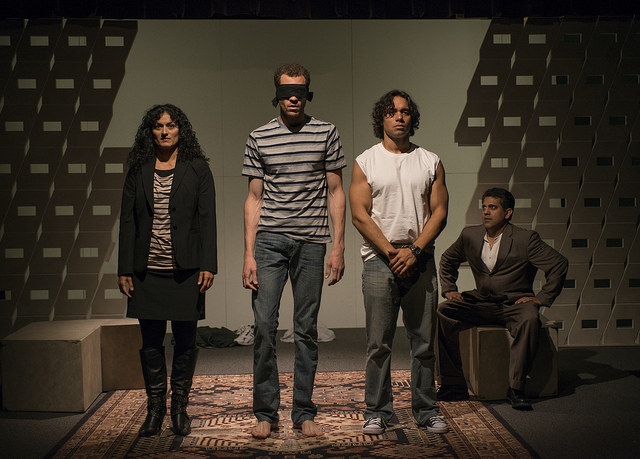Interview: Jamil Khoury Speaks Out About Silk Road Rising's Latest Production
By Melody Udell in Arts & Entertainment on Aug 27, 2013 7:00PM

Silk Road Rising's latest production, Invasion!, challenges misinformation and racial profiling.
Silk Road Rising—known for stimulating theater projects shown through the lens of Asian American and Middle Eastern cultures—is causing quite a stir with its newest production, Invasion!, which has now extended its run through Sept. 15. We caught up with Founding Artistic Director Jamil Khoury to chat about the theater community’s reaction to this highly charged, thought-provoking play.
CHICAGOIST: First, Invasion! is a tricky play to describe. The play hones in on identity, racial and cultural signifiers and how language as a tool plays into all of it, represented through a series of stories. How does the show's non-linear, atypical structure help drive the show?
JAMIL KHOURY: Invasion! is a play in which style very deliberately follows substance. The non-linearity reflects the absurdity of racial profiling, and the humor enables us to laugh at that absurdity. In a play about identity and identity politics, narrative relies on perception, and action corresponds to shifting perception. Perception, by definition, is non-linear. It's messy and complicated, unstructured, a motion graphic. Invasion! dramatizes the fears and phobias "we" project on Arab and Muslim men. Misperception breeds misperception, meanings get negotiated then renegotiated. Unwieldy thing, identity is.
C: In the beginning of the play, we learn about a Lebanese man named Abulkasem, who emerges throughout the play with several different, stereotype-defying identities. To you, who is Abulkasem and what does he symbolize?
JAMIL KHOURY: The day my father saw the play, he stood up during the talk back and said "Abulkasem represents every immigrant who's ever come to this country." Up until that point, I was viewing Abulkasem as an "every" Arab. My father took the character(s) to a whole other place for me that made even greater sense. Abulkasem is a metaphor for the immigrant experience. The struggles, the indignities, the defeats, the dreams, the victories, the transformations — the re-definition of self and the navigation of the many "selves" being projected upon you at all times. The immigrant being spoken for even when not speaking. The immigrant being misinterpreted to fit the interpreter's needs. The immigrant being blamed for our own failings and shortcomings.
C: In a blog post responding to Hedy Weiss's review of Invasion!, you claim a few of her comments make a case for racial profiling. The Sun-Times has since edited the review and removed some of the language that was "perceived as expressing a political opinion." This series of events has led to a larger discussion within the Chicago theater community. Did you envision this type of conversation — a debate, even — when you decided to produce this play?
JAMIL KHOURY: Silk Road Rising places art and activism at the center of our mission. Malik Gillani and I co-founded the company as a response to the attacks of September 11, 2001, and the backlash against Arab Americans and Muslim Americans that immediately followed. In many respects, Invasion! crystallizes our mission. It theatricalizes the scenarios that compelled us to produce theater in the first place. The fact that it is stimulating discussion and debate in Chicago's theater community validates the urgency of the play's message. Americans of Middle Eastern and South Asian backgrounds are being racially profiled. Racial profiling is an immoral, unconstitutional practice. It ascribes guilt to people of color and people of "suspect" backgrounds. Chicago theater-makers and audiences are today discussing Islamophobia and anti-Arab racism. They are recognizing the tremendous harm and injury that racial profiling inflicts on millions of innocent people. I believe that with awareness, with heightened consciousness, comes empathy, comes change. The demonization of Muslims and Arabs in this country has to stop. We are an integral part of the American story and our stories must be heard. We have been censored and erased for far too long. We have been maligned and misrepresented. We must be the authors of our own stories. We must control our own representation.
C: So now that the play has sparked quite a dialogue and has been extended to September 15, what do you hope Chicago audiences take away from this production?
JAMIL KHOURY: I want audiences to start questioning mainstream narratives about Middle Eastern and South Asian people. I want audiences to engage critically with what they hear and read about Muslims and Islam. I want audiences to embrace Arab Americans and Muslim Americans for who we are—contributing, law-abiding, loyal Americans. I want audiences to start challenging the lies and misinformation out there. I want audiences to be wary of so-called "terrorism experts." I want audiences to stop judging "others" based on their names and accents, their religious beliefs and ethnic backgrounds. I want audiences to be vigilant in calling out racism and bigotry.
Invasion! runs through Sunday, Sept. 15 at the Historic Chicago Temple Building, 77 W. Washington St., tickets available by 312-857-1234 or purchasing online